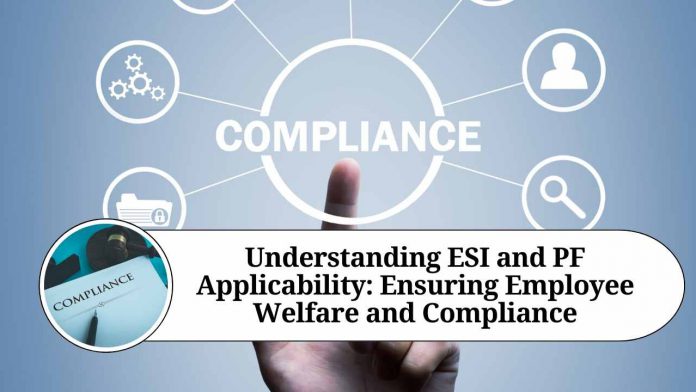Introduction
In the realm of employee benefits and labor laws, two significant terms often come up in discussions: Employee State Insurance (ESI) and Provident Fund (PF). These statutory schemes have been introduced to safeguard the welfare of employees and ensure their financial security. In this blog, we will delve into the applicability of ESI and PF, exploring their features, benefits, and the obligations they entail for both employers and employees.
What is ESI and its Applicability?
- Employee State Insurance (ESI): is a social security and health insurance scheme provided by the government of India. It is aimed at protecting employees against financial hardships arising from medical contingencies, such as sickness, maternity, disability, and death. ESI is applicable to establishments with a specified minimum number of employees, as determined by the government.
- The Benefits of ESI: ESI offers a range of benefits to employees, including:
a) Medical Benefits: ESI provides comprehensive medical care, including outpatient, inpatient, specialist consultations, medicines, and diagnostic tests.
b) Sickness and Maternity Benefits: It offers cash benefits during periods of temporary disablement due to sickness or maternity.
c) Disablement Benefits: Employees who become disabled due to work-related injuries are eligible for a monthly payment to compensate for the loss of earning capacity.
d) Dependent Benefits: In case of the employee’s death, dependents are entitled to a monthly payment as a survivor benefit.
- Applicability of Provident Fund (PF): The Provident Fund (PF) is a retirement savings scheme that ensures financial security for employees after their employment ends. The Employees’ Provident Fund Organization (EPFO) manages the PF scheme in India. PF is applicable to establishments with a specified minimum number of employees, similar to ESI.
- The Benefits of PF: The PF scheme offers several advantages to employees, such as:
a) Retirement Corpus: PF accumulates over the course of an employee’s working years, providing a substantial corpus upon retirement.
b) Tax Benefits: Contributions made towards PF are eligible for tax benefits under the Income Tax Act.
c) Loan and Withdrawal Facilities: PF allows employees to avail themselves of loans and partial withdrawals for specific purposes, such as housing, education, or medical emergencies.
- Employer and Employee Obligations: Under both ESI and PF, employers and employees have certain obligations to fulfill:
a) Employer Obligations:
- Registering eligible employees under the respective schemes within the specified time frame.
- Calculating and deducting the required contributions from employee salaries.
- Depositing the employer’s and employee’s contributions to the appropriate authorities within the stipulated time period.
- Maintaining accurate records and submitting necessary reports to the authorities.
b) Employee Obligations:
- Providing accurate and timely information to the employer for registration under ESI and PF.
- Consistently contributing the required amount towards ESI and PF from their salaries.
- Adhering to the rules and regulations of the schemes.
- Informing the employer about any changes in employment or personal details that may affect ESI or PF applicability.
Conclusion
Employee State Insurance (ESI) and Provident Fund (PF) are crucial statutory schemes designed to protect the welfare and financial security of employees. Understanding their applicability, benefits, and associated obligations is essential for both employers and employees to ensure compliance and enjoy the advantages they offer. By adhering to the regulations and making the necessary contributions, employers can fulfill their duty towards their employees, while employees can safeguard their future and well-being.
Other Related Blogs: Section 144B Income Tax Act
Frequently Asked Questions (FAQs)
Q. What is the minimum employee count required for ESI and PF applicability?
For ESI, establishments with 10 or more employees (in some states, it is 20 or more) are required to register under the scheme.
For PF, establishments with 20 or more employees are generally required to register under the scheme.
Q. Are temporary or contract employees counted towards the minimum employee count?
Yes, both ESI and PF include permanent, temporary, and contract employees when determining the minimum employee count for applicability.
Q. Is ESI applicable only to certain types of establishments?
No, ESI is applicable to most establishments, including factories, shops, hotels, restaurants, cinemas, and educational or medical institutions.
Q. Can an employer voluntarily register under ESI and PF even if the minimum employee count is not met?
Yes, employers can voluntarily register under ESI and PF, even if the minimum employee count is not met. This allows them to provide the benefits of these schemes to their employees.
Q. Is there any wage limit for ESI and PF applicability?
For ESI, the wage limit for applicability is Rs. 21,000 per month. Employees earning wages up to this limit are eligible for ESI coverage.
For PF, there is no wage limit for applicability. All employees, regardless of their wages, are eligible for PF coverage.
Q. Can an employer exempt certain employees from ESI or PF coverage?
No, employers cannot selectively exempt employees from ESI or PF coverage. If an establishment falls under the applicable criteria, all eligible employees must be covered under these schemes.
Q. Can an employee voluntarily opt-out of ESI or PF coverage?
No, employees cannot opt-out of ESI or PF coverage if their establishment falls under the applicable criteria. Coverage is mandatory for eligible employees.
Q. What are the penalties for non-compliance with ESI and PF regulations?
Non-compliance with ESI and PF regulations may result in penalties, fines, and legal consequences. These can include monetary penalties, prosecution, and imprisonment.
Q. Is it possible to transfer ESI or PF benefits when changing jobs?
Yes, employees can transfer their ESI and PF benefits when changing jobs. The process involves providing the necessary details and documentation to the new employer, who will facilitate the transfer of benefits.
Q. Are ESI and PF benefits available to international employees working in India?
ESI and PF benefits are generally applicable to both Indian and international employees working in India, subject to meeting the eligibility criteria.




















